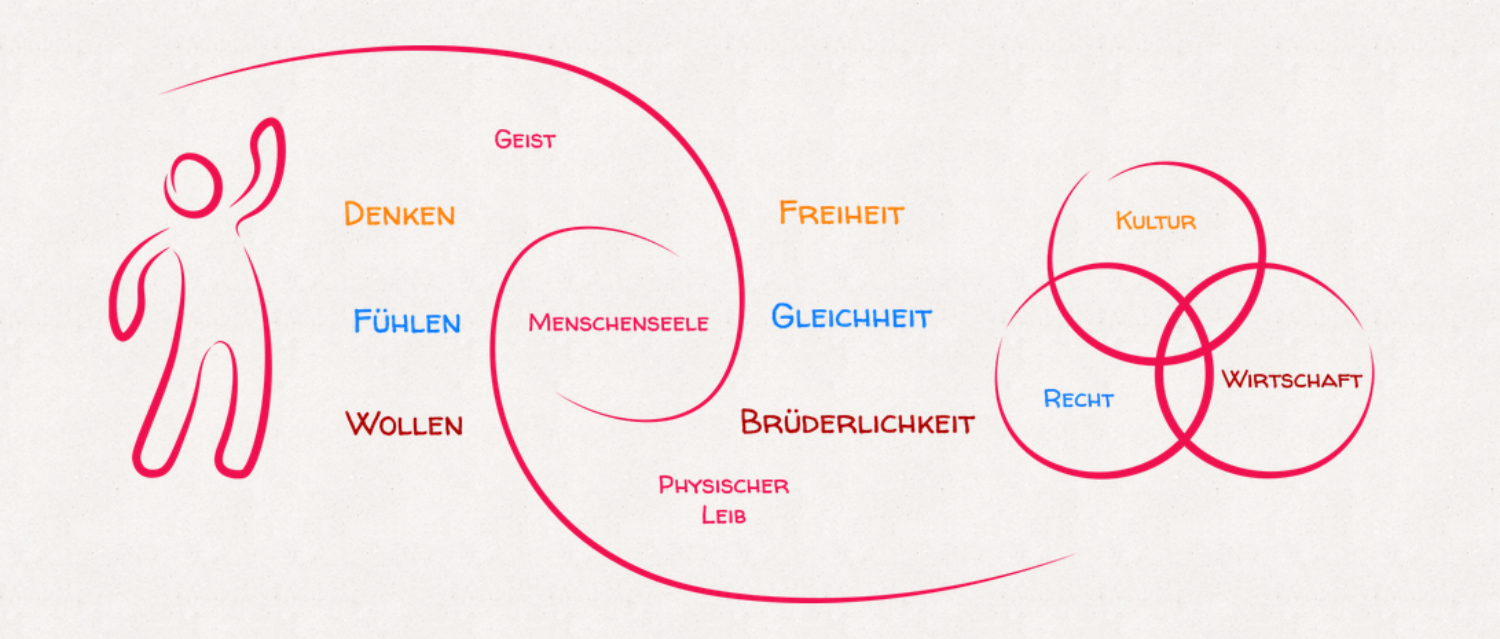Threefolding
Threefold Social Organism
Three Spheres
As human beings we have three capacities: thinking, feeling and acting. Each of those capacities have a correspondence with the different spheres of the society and are based on an universal value: the freed thinking for the cultural life, the feeling of equality for the other in the legal sphere and the value of solidarity in the economic life. The autonomy of each sphere and the striving for each appropriate principle would open the possibility for a healthy, productive and peaceful society.


Cultural Life
This is the sphere of freedom, where each individual capacity can be unfold to enrich and develop the society as a whole. It is the field of education, art, science and religion.

Legal-Political Life
The human rights are independent from the economic power and they do not distinguish among people, the core principle is equality. In this field we have the relationship between human beings as equals.

Economic Life
The economic life is the transformation of the nature into commodities that meet human needs. The principle that rules this sphere is solidarity: the needs of the other are covered by my work, as my needs are covered by the work of the others.
Context
Threefolding by Rudolf Steiner is based on the careful observation of the life developed by Goethe, where part of a dynamic and living whole to seek to understand the parts in their context and movement. Thus conceives society as a whole, a dynamic and living social organism that is in constant movement from human actions. Rudolf Steiner does not give a guideline to follow, but rather a way of apprehending social reality and its challenges, understanding them from their specificity and thus elaborating responses adapted to their particular context. There is no pretense of objectivity or a definitive solution for the social problem.
In the context of the First World War, towards the end of 1917, Rudolf Steiner maintained contact with the highest personalities in the political and cultural field of Central Europe, explaining his ideas in order to provide a possible solution to the social conflicts of the moment. Precisely this context of war did not allow the momentum to prosper. At the end of the war, this impulse emerges again, but now with greater force. At the beginning of the year 1919 “The call to the German people and the civilized world” was published in the main newspapers of Germany, Switzerland and Austria. This call had more than 250 signatories, people recognized from the cultural and economic world and although it did not have the expected success, it inspired different initiatives linked to social transformation such as the Waldorf pedagogy, the camphill movement, ethical banking and more.
The three universal values Liberty, Equality and Fraternity already proclaimed in the French Revolution live as power within each human being, and it is an individual process the development of them. It is not about how to impose a system or a model, but a process of consciousness that is based on individual freedom and expands to the social from the transformation of the forces of thinking, feeling and doing of each individual. Rudolf Steiner speaks of an individual aware of his historical role, responsible for his actions and a transformer of reality from this universal ethics applicable to each context. The social threefolding is an impulse of social transformation.